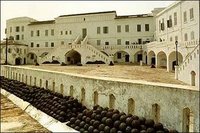Nana Andoh, Africa: Traditional Achitecture and Urbanism Blog
 |
| 
Ghana

Traditional Village of Boadua
 |
|  |
| 
Colonial Architecture, Portuguese, in the Cape Coast Region
 |
| 
Fort James, Fort Elmina, slave castles from the bitter past

Church of St. Catherine, Accra

Modern Monument at Independence Square, Accra
An African urban designer, born in Ghana, shares with us his thoughts and observations about his mother land. His question "What is African Architecture" is a question similar to that asked by a lot of other people from the developing world. Decades after independence they are perhaps now more ready to reevaluate their past, including that of their colonial period. Was the post-independence period really much better than what when on before? Mr. Andoh doesn't quite say these things, but almost.
And he is curious about the traditional architecture before colonization, perhaps how it may have influenced the European architecture.
Like Andoh, I have thought about architectural and national identity, and the conclusion I come to is that national identity ultimately comes from its people rather than the bricks and mortar. The buildings and their decorative details are indeed interesting, but the history of the people who built and lived in them is not only more fascinating, but also tells a more complete story.
The movement for a national (or regional) identity in urbanism and architecture ought to start first with the people, to try to formulate their concerns and aspirations. And then, after that: to work out the best way to meet the challenges. If the search for the solution includes the parameters specific to the people and to the place, a unique identity will be naturally follow.
1 comment:
I would agree that the history of any place begins with the people. However, what would happen if due to some unforseen event, there were no people to pass on the history?
Example, Pompei in 72AD. Mount Vesuvius errupts and an entire city ceases to exist. Everything we "believe" to know about the people of Pompei, we learned from what they left behind in the masterplan of their city, the attention paid to the architecture, the craftsmanship in the details, and the frescoes on the walls of the buildings. All of these factors went into giving us an idea of who the citizens of Pompei were.
The question now being posed by Mr. Andoh is, what story, if any, will African buildings tell about it's people? That they were colonized by other people and never developed an identity all their own? Or that they had a very strong identity to begin with, and despite centuries of colonization, they never lost that identity? We can understand this by discerning between what is African architecture and what is Colonial architecture in Africa, and in doing so, we begin to understand the story that we leave behind.
Post a Comment